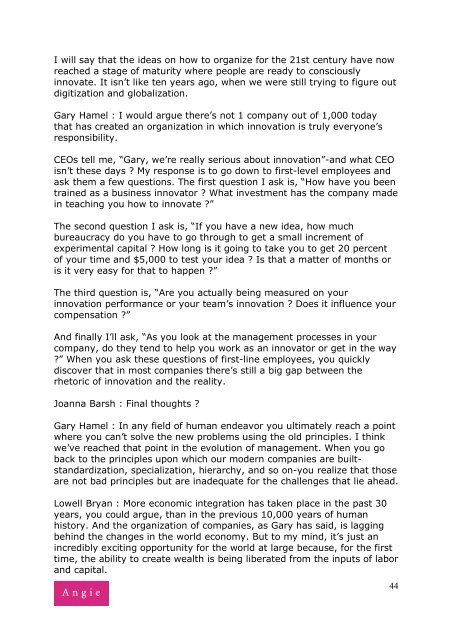nonfiction.fr, 17 décembre 2007 - Le blog de l'agence Angie
nonfiction.fr, 17 décembre 2007 - Le blog de l'agence Angie
nonfiction.fr, 17 décembre 2007 - Le blog de l'agence Angie
- No tags were found...
Create successful ePaper yourself
Turn your PDF publications into a flip-book with our unique Google optimized e-Paper software.
I will say that the i<strong>de</strong>as on how to organize for the 21st century have nowreached a stage of maturity where people are ready to consciouslyinnovate. It isn’t like ten years ago, when we were still trying to figure outdigitization and globalization.Gary Hamel : I would argue there’s not 1 company out of 1,000 todaythat has created an organization in which innovation is truly everyone’sresponsibility.CEOs tell me, “Gary, we’re really serious about innovation”-and what CEOisn’t these days ? My response is to go down to first-level employees andask them a few questions. The first question I ask is, “How have you beentrained as a business innovator ? What investment has the company ma<strong>de</strong>in teaching you how to innovate ?”The second question I ask is, “If you have a new i<strong>de</strong>a, how muchbureaucracy do you have to go through to get a small increment ofexperimental capital ? How long is it going to take you to get 20 percentof your time and $5,000 to test your i<strong>de</strong>a ? Is that a matter of months oris it very easy for that to happen ?”The third question is, “Are you actually being measured on yourinnovation performance or your team’s innovation ? Does it influence yourcompensation ?”And finally I’ll ask, “As you look at the management processes in yourcompany, do they tend to help you work as an innovator or get in the way?” When you ask these questions of first-line employees, you quicklydiscover that in most companies there’s still a big gap between therhetoric of innovation and the reality.Joanna Barsh : Final thoughts ?Gary Hamel : In any field of human en<strong>de</strong>avor you ultimately reach a pointwhere you can’t solve the new problems using the old principles. I thinkwe’ve reached that point in the evolution of management. When you goback to the principles upon which our mo<strong>de</strong>rn companies are builtstandardization,specialization, hierarchy, and so on-you realize that thoseare not bad principles but are ina<strong>de</strong>quate for the challenges that lie ahead.Lowell Bryan : More economic integration has taken place in the past 30years, you could argue, than in the previous 10,000 years of humanhistory. And the organization of companies, as Gary has said, is laggingbehind the changes in the world economy. But to my mind, it’s just anincredibly exciting opportunity for the world at large because, for the firsttime, the ability to create wealth is being liberated <strong>fr</strong>om the inputs of laborand capital.44











